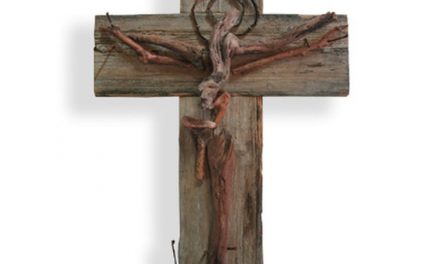Lectionary 80
Is 43:18-19, 21-22, 24b-25
Ps 41:2-3, 4-5, 13-14
2 Cor 1:18-22
Mk 2:1-12
The gospel reading for this week challenges us to see faith as something more than an individual act of belief. The Catechism tells us that “Faith is a personal act . . . But faith is not an isolated act. No one can believe alone, just as no one can live alone. You have not given yourself faith as you have not given yourself life. The believer has received faith from others and should hand it on to others. . . I cannot believe without being carried by the faith of others, and by my faith I help support others in the faith” (166).
We see this idea vividly played out in our reading from Mark. We have an unnamed paralytic who seems to play no active role in the story. We do not know if he asked his friends to bring him to Jesus. We know only that four men, also unnamed, went to extraordinary lengths to bring this paralytic to Jesus, going through the roof because the crowds were so great. When Jesus sees their faith, he says to the paralytic, “Child, your sins are forgiven.” It is by the faith of the men who brought the paralytic forward that the man is healed, both in his soul through the forgiveness of sins and his body when Jesus says to him “Rise, pick up your mat, and go home.”
This story reveals to us the collective nature of faith. Just as human beings share a certain solidarity in sin, so too do we share a certain solidarity in faith through the Church. We are reminded of this solidarity in faith as we prepare for the Lenten season, starting next Wednesday, which is a baptismal season as the Church prepares to incorporate into it new members at Easter. Baptism is a sacrament of faith “[b]ut faith needs the community of believers. It is only within the faith of the Church that each of the faithful can believe. The faith required for Baptism is not a perfect and mature faith, but a beginning that is called to develop. The catechumen or the godparent is asked: ‘What do you ask of God’s Church?’ The response is: ‘Faith!'” (CCC 1253).
In baptism, we are incorporated into the body of Christ, members of the same body and members of one another. As such, we no longer belong to ourselves, but to one another, and most especially, to the one who died and rose for us. This means that we are never alone in our journey of faith. In and through the Church, we are supported in our faith, and even when our faith fails, we can count on the other members of the body to carry us to the Lord like the four men carried the paralytic. And the flip side of this is that we have a responsibility towards our brothers and sisters in Christ, to carry them when they are unable to make it to Christ themselves.
These past two weeks, there has been a lot of talk about the HHS mandate and the effect that it will have on Catholic organizations like Catholic Charities. One of the things we should be mindful of in the midst of all of this is the nature of Catholic organizations like Catholic Charities who really work to fulfill this same mission as the four men in our gospel reading, carrying people like migrant workers, single mothers, sex trafficking victims, and undocumented immigrants to Christ with the faith of the Church, and saying to them “Be healed” even when they cannot ask for healing themselves. This is what the Catholic faith is about–not a “personal relationship with Jesus” but a collective faith that reaches out into the world with the arms of Christ who calls all to Himself, even those who can’t ask for it on their own. This is the faith we are invited into in baptism, the faith we renew as we welcome new members at the end of the Lenten season, the faith that sustains us in the Church. May this faith increase as we enter the Lenten season.




